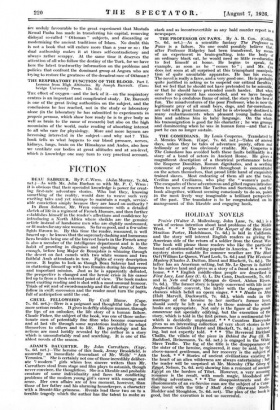FICTION
BEAU SABREUR. By P. C. Wren. (John Murray. 7s. 6d. net.)—As with Mr. John Buchan so with Mr. P. C. Wren : it is obvious that their specialist knowledge is power for creat- ing first-rate adventure stories. Who but they, knowing something of the reality, would dare to weave such very exciting tales and yet manage to maintain a rough, service- able conviction simply because they are based on authority ? In Beau Sabreur, Mr. Wren commences with a detailed sketch of lite in a regiment of French Hussars, and then further establishes himself in the reader's affections and confidence by introducing a North Africa where sheikhs are the genuine article instead of handsome men who are slightly sunbronzed, or fit mates for any nice woman. So far so good, and a few sabre fiEhts thrown in. By this time the reader, reassured, is well braced up : he knows that the supremely dashing and humorous hero besides being one of the bravest hearts in the French army is also a member of the intelligence department and is in the habit of prowling in disguises and speaking Arabic. Sure enough, before long Major de Beaujolais is whizzing through the desert on fast camels with two white women and two faithful Arab attendants in tow. Fights of every description occur. It begins to look as though Beau Sabreur had erred in cluttering himself up with two females during his dangerous and important mission. Just as he is apparently defeated, the perspective is changed and the heroic crisis in his career led up to from a fresh external point of view. The book makes most exciting reading and is shot with a most unusual humour. Trials of wit and of swordsmanship and the full array of battle follow in swift succession and the reader must turn the pages, full of anticipation until the end.






































 Previous page
Previous page